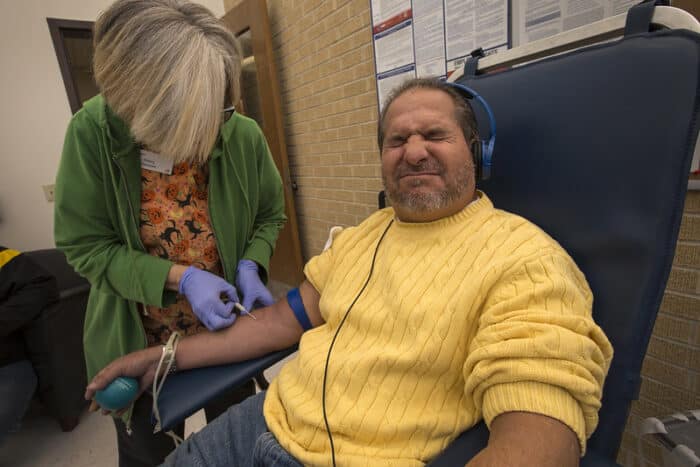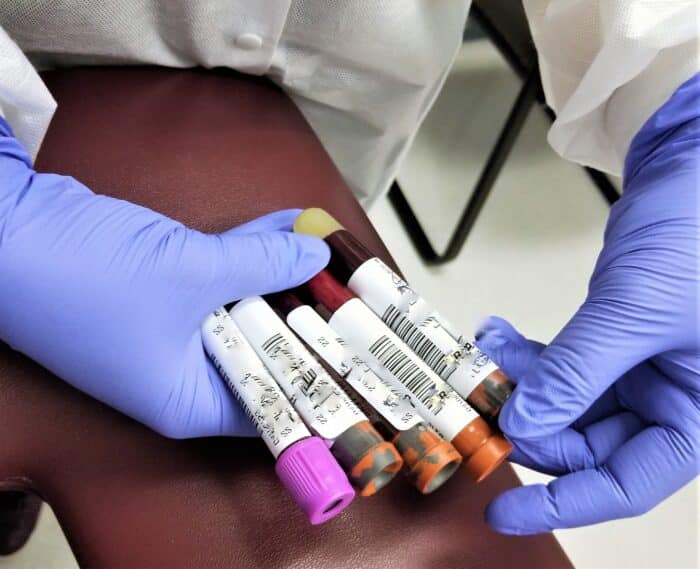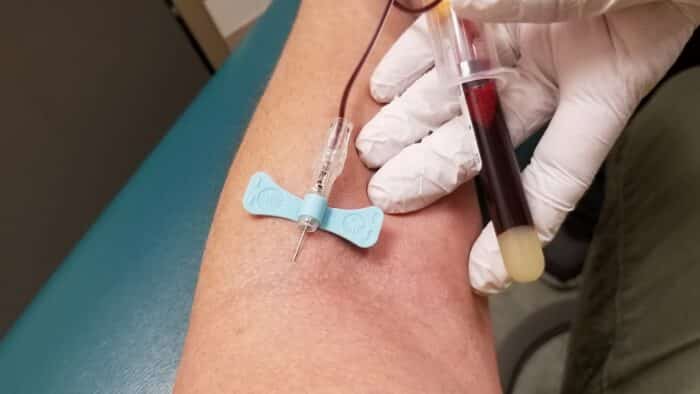If you’re here, you might be curious about pursuing phlebotomy as your career.
Or you might be an aspiring phlebotomist, wondering what you can do with a phlebotomy certificate.
If you fit any of those cases, or if you’re interested in knowing where a phlebotomy certificate can get you, you’re in the right place.
In this article, we will uncover what a phlebotomy certificate is, what jobs you can get with one, and what can you do with a phlebotomy certification.
So sit back and get your reading glasses on. Let’s get started.
What is a Phlebotomy Certificate?
A phlebotomy certificate is an educational credential that you get after you complete a training program. It shows a person’s ability to safely and effectively draw blood from patients.
To earn a phlebotomy certificate, you typically need to complete a training program that teaches you the proper techniques for blood collection, patient interaction, and safety measures. These programs are usually offered by community colleges, vocational schools, or healthcare training centers.
Once you finish your training, you might need to pass a certification exam to prove your skills. Having a phlebotomy certificate can make you more attractive to employers in hospitals, clinics, laboratories, or blood donation centers, as it assures them that you’re qualified and competent in this essential medical procedure.
Also see: How to Become a Phlebotomist

Do You Want To Become a Phlebotomist? Check Out Free Phlebotomist Masterclass!
In our masterclass you learn:
- How to be a Phlebotomist faster…in just 2 months!
- Avoid student debt & driving to classes
- #1 thing employers want from Phlebotomists
- How to stand-apart & get a university certificate for a strong resume
What Jobs Can I Get With a Phlebotomy Certificate?
A phlebotomy certificate opens the door to several job opportunities in the healthcare field. With this certification, you can work as a phlebotomist in various settings, including hospitals, medical clinics, diagnostic laboratories, and blood donation centers.
Let us take a look at a few professions you can tap into using a phlebotomy certificate:
- Phlebotomist: As a phlebotomist, you’ll be responsible for drawing blood from patients for various purposes, such as medical testing, transfusions, or blood donations. You can work in hospitals, clinics, laboratories, or blood donation centers.
- Medical Laboratory Technician: Some phlebotomists go on to become medical laboratory technicians. In this role, you not only collect blood samples but also perform basic laboratory tests on them. This job typically involves working in a hospital or clinical laboratory.
- Blood Bank Technician: If you have a particular interest in blood banking, you can work in a blood bank as a technician. Your primary responsibilities will include collecting, testing, and processing blood donations.
- Research Assistant: In some research settings, particularly clinical trials, phlebotomists are needed to collect blood samples from study participants. A phlebotomy certificate can be valuable in such research assistant roles.
- Long-term Care Facilities: Phlebotomists are also employed in long-term care facilities, like nursing homes, to draw blood for resident health assessments and monitoring.
Read: What is a Phlebotomist
Getting Certified- Is It Helpful?
Even though getting certified as a phlebotomist is not necessary in most states, it is highly preferred by employers while hiring.
Becoming a certified phlebotomist offers several advantages. Certification serves as official recognition of your skills and dedication to blood collection. It enhances job opportunities, especially in healthcare settings like hospitals and clinics, often leading to higher pay.
Certification also ensures you’re well-trained in safety and technique, reducing the risk of errors. Moreover, it opens doors to career growth and necessitates ongoing education to stay updated in the field, making you a well-rounded and competent professional in phlebotomy. This also increases your chances of bagging a higher salary as compared to an uncertified phlebotomist.
If you’re also confused between a certificate and a certification, we got you.
Let us break down the main difference between the two.
A phlebotomy certificate is like a diploma you get after completing a training program in blood drawing. It shows you finished your training.
Certification is like an official stamp of approval. It means you passed an exam to prove you’re good at drawing blood safely and correctly.
So, the certificate says you finished training, and the certification says you’re really good at the job. You often need both to work as a phlebotomist, but they’re different steps in becoming professional blood drawers.
See more: How Long Does it Take to Become a Phlebotomist
What Can You Do With a Phlebotomy Certification?
Having a phlebotomy certification means you’re qualified to be a phlebotomist, which is someone who collects blood samples from people.
This certification allows you to work in places like hospitals, clinics, labs, and blood donation centers. Your main job is to safely and accurately gather blood for different reasons like medical tests or research.
With this certification, you’ll follow strict rules to keep patients safe, interact well with them, and handle blood samples correctly. Plus, it can open doors for career growth, like becoming a lead phlebotomist or exploring other healthcare roles.
In a nutshell, a phlebotomy certification gives you a stable and important job in healthcare, along with chances to advance in your career and make a positive impact on patient care.
Read: Phlebotomist Requirements
Related Resources:
- Day in the Life of a Phlebotomist
- Phlebotomist Job Description
- Phlebotomist Duties
- What is the Difference Between a Licensed Phlebotomist and Certified Phlebotomist?
- Where Can a Phlebotomist Work?
- Pros and Cons of Being a Phlebotomist
- Phlebotomy Externship
- How To Get a Phlebotomy Certification
- How Long Does it Take to Get a Phlebotomy Certification?
- How Long is a Phlebotomy Course?
- Phlebotomist Cover Letter
- Therapeutic Phlebotomy
- Phlebotomist Training
- Cardio-Phlebotomy Technician
- Online Phlebotomy Classes
- Order of Draw Phlebotomy
- Phlebotomy Internship
- 4-Week Phlebotomy Classes Online
Related Articles
-
How to Be Successful in College in 2022 – 7 Simple Tips to Succeed
-
How Do Scholarships Work? Read This First…Truth is Shocking
-
7 Best College Majors 2024: What Should I Major In?
-
How to Choose a College – 10 Things You Must Consider in 2024
-
Why Go to College? Top 13 Benefits for Adult Students in 2022
-
Top 5 Best Alternatives to Community College for 2024








